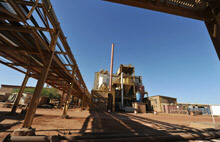
Typical street scene in Santa Ana, El Salvador. (Photo: iStock)
IMF Survey: Oil, Uranium Projects Brighten Medium-term Prospects in Niger
December 19, 2011
- Higher natural resource revenues to improve fiscal, external position
- Resources earnings should be leveraged into faster growth, poverty reduction
- Negotiations with IMF on new program expected to start soon
A new crude oil processing project and rising uranium production are set to boost Niger’s economic growth from next year, the IMF said in its regular review of the West African nation’s economy.

Uranium mine in Arlit, Niger: natural resource revenues set to increase earnings but also expose country to price volatility (photo: Issouf Sanogo/AFP)
ECONOMIC HEALTH CHECK
Higher natural resources revenues should also help improve Niger’s fiscal and external position in the medium term.
An integrated oil project that includes extraction and refining of 20,000 barrels per day of crude oil is due to start operations in 2012. A new uranium mine that will make Niger the world’s second-largest uranium producer is scheduled to start production by 2014.
IMF Managing Director Christine Lagarde will arrive in Niger during a December 18-22 trip to Africa. Her itinerary includes meeting with President Mahamadou Issoufou and taking part in a cabinet meeting focused on “The Challenges of Economic Development in Niger”. She will also address the National Assembly, and meet with representatives of the financial institutions and the private sector.
Mining exports
Niger’s oil and mining exports are projected to triple between 2011 and 2016, boosting government revenue from natural resources. These large projects are expected to improve Niger’s fiscal and external position in the medium term, creating favorable conditions for growth and poverty reduction. Niger’s GDP growth is forecast to soar to 14.1 percent in 2012 from a projected 3.8 percent in 2011.
Niger’s main priority in the period ahead is to leverage the expected scaling up of oil and mining production to accelerate growth and poverty reduction. The IMF review said Niger’s new government has adopted an ambitious development strategy, based on the use of oil and mining revenue to finance public investment in infrastructure, agriculture, health, and education.
IMF missions visiting Niger urged careful management of natural resources, medium-term planning of the public investment program, continued fiscal reform to enhance domestic revenue collection and improve the efficiency of expenditure, and measures to improve the business climate.
Libya crisis effects
Despite its natural resource endowment, Niger remains a low-income country. Its economy remains highly dependent on rain-fed agriculture and vulnerable to external shocks. The country relies substantially on external assistance.
A democratically elected government took office in April 2011, and Niger’s relations with international donors normalized. The crisis in Libya triggered the return of tens of thousands of Nigerien workers, leading to a decline in Niger’s remittances from abroad.
Budget implementation remained on course through August 2011, with revenue exceeding targets and expenditure in line with projections. The 2012 budget is expected to maintain a sound fiscal position while substantially increasing public investment. The impact of rising global food prices on inflation has remained modest thus far.
Niger’s three-year program with the IMF, supported by the Extended Credit Facility, expired in June 2011. Program implementation had been on track initially, but was interrupted by a military coup in February 2010.
Following the recognition of the transitional government in September 2010, the IMF resumed normal engagement with the authorities; but efforts to complete further reviews under the arrangement were constrained by the complex political situation. The new authorities have expressed their interest in negotiating a follow-up program as soon as possible. Negotiations on a new program are expected to start shortly.
Fuel subsidy costs
In 2010, the cost for Niger of subsidizing fuel reached about 1 percent of GDP. These subsidies were not only costly but ill targeted, since they did not benefit the poorest segments of the population. Since June 2011, the government adopted a strategy to gradually eliminate the subsidies, while adopting mitigating measures to protect the urban poor from increases in transportation costs.
The authorities have recently decided to pass part of the benefits of the new oil production to domestic consumers in the form of lower prices at the pump. The extent of the subsidies is, however, limited: the agreed prices are expected to be about 14 to 17 percent below import prices.
Natural resource management
Enhancing transparency in the management of natural resources has been the focus of interest for the authorities and society. As a result, Niger’s 2010 constitution requires the publication of all contracts for the exploration and exploitation of natural resources. Niger is actively engaged in the Extractive Industries Transparency Initiative and was declared in compliance with the standards of the initiative in March 2011.
The state is directly involved as co-shareholder in the main mining and oil projects. This direct exposure implies risks, as the authorities relied on external financing to contribute their share of investment costs in recent projects, in some cases contracting expensive loans and increasing public debt. A debt sustainability analysis concluded that this new borrowing contributed to a rise in Niger’s risks of debt distress from low to moderate.
Natural resource revenues are expected to increase available resources but also expose the country to commodity price volatility. In the medium term, Niger would benefit from adopting a fiscal strategy to confront adverse shocks and stabilize expenditure.


